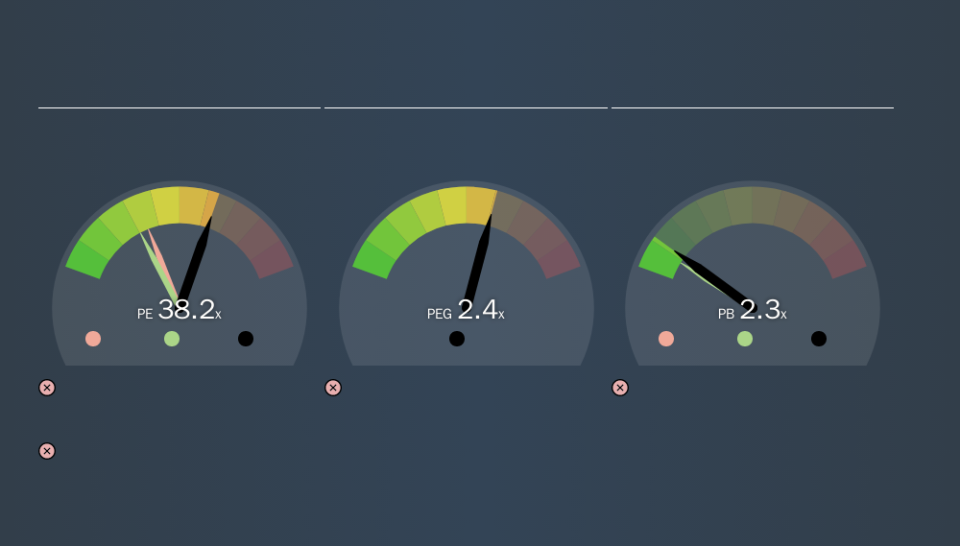Why International Flavors & Fragrances Inc.'s (NYSE:IFF) High P/E Ratio Isn't Necessarily A Bad Thing

Today, we'll introduce the concept of the P/E ratio for those who are learning about investing. We'll show how you can use International Flavors & Fragrances Inc.'s (NYSE:IFF) P/E ratio to inform your assessment of the investment opportunity. International Flavors & Fragrances has a price to earnings ratio of 38.24, based on the last twelve months. In other words, at today's prices, investors are paying $38.24 for every $1 in prior year profit.
See our latest analysis for International Flavors & Fragrances
How Do I Calculate International Flavors & Fragrances's Price To Earnings Ratio?
The formula for price to earnings is:
Price to Earnings Ratio = Price per Share ÷ Earnings per Share (EPS)
Or for International Flavors & Fragrances:
P/E of 38.24 = $131.22 ÷ $3.43 (Based on the year to September 2019.)
Is A High Price-to-Earnings Ratio Good?
A higher P/E ratio means that investors are paying a higher price for each $1 of company earnings. That isn't necessarily good or bad, but a high P/E implies relatively high expectations of what a company can achieve in the future.
Does International Flavors & Fragrances Have A Relatively High Or Low P/E For Its Industry?
The P/E ratio essentially measures market expectations of a company. As you can see below, International Flavors & Fragrances has a higher P/E than the average company (20.3) in the chemicals industry.
Its relatively high P/E ratio indicates that International Flavors & Fragrances shareholders think it will perform better than other companies in its industry classification. The market is optimistic about the future, but that doesn't guarantee future growth. So investors should always consider the P/E ratio alongside other factors, such as whether company directors have been buying shares.
How Growth Rates Impact P/E Ratios
If earnings fall then in the future the 'E' will be lower. Therefore, even if you pay a low multiple of earnings now, that multiple will become higher in the future. Then, a higher P/E might scare off shareholders, pushing the share price down.
International Flavors & Fragrances saw earnings per share decrease by 3.6% last year. And it has shrunk its earnings per share by 6.2% per year over the last five years. So it would be surprising to see a high P/E.
A Limitation: P/E Ratios Ignore Debt and Cash In The Bank
One drawback of using a P/E ratio is that it considers market capitalization, but not the balance sheet. That means it doesn't take debt or cash into account. Hypothetically, a company could reduce its future P/E ratio by spending its cash (or taking on debt) to achieve higher earnings.
While growth expenditure doesn't always pay off, the point is that it is a good option to have; but one that the P/E ratio ignores.
Is Debt Impacting International Flavors & Fragrances's P/E?
International Flavors & Fragrances's net debt equates to 28% of its market capitalization. You'd want to be aware of this fact, but it doesn't bother us.
The Bottom Line On International Flavors & Fragrances's P/E Ratio
International Flavors & Fragrances's P/E is 38.2 which is above average (18.3) in its market. With modest debt but no EPS growth in the last year, it's fair to say the P/E implies some optimism about future earnings, from the market.
When the market is wrong about a stock, it gives savvy investors an opportunity. People often underestimate remarkable growth -- so investors can make money when fast growth is not fully appreciated. So this free visual report on analyst forecasts could hold the key to an excellent investment decision.
Of course, you might find a fantastic investment by looking at a few good candidates. So take a peek at this free list of companies with modest (or no) debt, trading on a P/E below 20.
We aim to bring you long-term focused research analysis driven by fundamental data. Note that our analysis may not factor in the latest price-sensitive company announcements or qualitative material.
If you spot an error that warrants correction, please contact the editor at editorial-team@simplywallst.com. This article by Simply Wall St is general in nature. It does not constitute a recommendation to buy or sell any stock, and does not take account of your objectives, or your financial situation. Simply Wall St has no position in the stocks mentioned. Thank you for reading.

